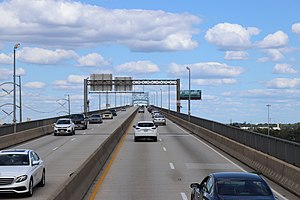George C. Platt Memorial Bridge
In 1967, a steel dividing wall was installed to separate eastbound from westbound traffic lanes. The lack of a barrier led to more than 30 head-on collisions on the bridge between 1964 and 1967. The coming wall was announced by the State Highway Department on November 15, 1967.

The bridge passes over an oil refinery (originally owned by Gulf Oil, then by Sun Oil, now by Philadelphia Energy Solutions). Fires at the refinery have several times imperiled the bridge and even closed it for several hours during the 1975 Philadelphia Gulf refinery fire. On August 17, a fire began in a tank to the northeast of the bridge that was being filled with Venezuelan crude oil. As the fire enveloped much of the refinery, several explosions put a large crack in a smokestack next to the bridge. Officials closed the bridge for several hours, fearing that the stack might collapse or the fire might damage the bridge. Eight firefighters died fighting the fire.
In 1986, two bronze bas-reliefs of Platt's visage were mounted on poles at each end of the bridge. The works were commissioned by Platt's great-great-grandson, Lawrence Griffin Platt, who raised $10,000 with the help of a former Gulf Oil executive, and were sculpted by Philadelphia artist Reginald E. Beauchamp. Both were later stolen, the first in 1987, and the second some time later. A $500 reward offered by the Philadelphia Daily News in 2002 was unsuccessful in securing their return.
In June 2011, PennDOT began a three-year, $42.8 million rehabilitation project to repair and maintain the bridge, enabling it to continue to safely carry vehicular and pedestrian traffic for decades to come. Crews painted the bridge's steel truss and structural steel underneath the spans to protect them from the elements. They also rehabilitated and resurfaced the center truss spans; resurfaced concrete approach spans; repair structural steel; replaced or improved expansion joints; repaired concrete piers; repaired and replaced guide rail; and replaced damaged pedestrian railings. During construction, the bridge's four lanes were reduced to two; one in each direction. From May 7, 2012, until the completion of construction in June 2014, trucks and buses weighing more than seven tons or carrying hazardous material were banned from using the bridge to minimize the risk of accidents on one-lane sections.
By 2018, the new paint started to peel away from areas of the superstructure above the deck, and the exposed metal began to rust.
See also
List of crossings of the Schuylkill River
References
- ^ "Platt Bridge Overview". PennDOT. Archived from the original on 5 October 2012. Retrieved 9 July 2012.
- ^ "GEORGE C. PLATT MEMORIAL BRIDGE – OFFICIAL DESIGNATION" (PDF). PennDOT. Retrieved 9 July 2012.
- ^ stevations (2012-10-01), WFIL 560 Philadelphia PA 1967 Jay Cook, archived from the original on 2021-12-21, retrieved 2018-08-14
- ^ Hinkleman, Michael (September 19, 2002). "Stolen bridge signs still unaccounted for; $500 reward for markers taken in late '80s". The Philadelphia Daily News: M08.
- ^ "Lane Closures and Traffic Stoppages Saturday and Sunday on Bartram Avenue at Route 291 (Penrose Avenue) Overpass in Philadelphia". PennDOT. Archived from the original on 31 January 2013. Retrieved 9 July 2012.
- ^ "Platt Bridge Travel Restrictions Start Feb. 20 in Philadelphia". PennDOT. Archived from the original on 31 January 2013. Retrieved 9 July 2012.
- ^ Mccormick, Annie (2014-06-06). "Platt Bridge closing for final phase of construction". 6abc.com. Retrieved 2016-02-22.
- ^ Abrams, Mark (3 May 2012). "Trucks Carrying Chemicals Banned From Platt Bridge Until 2014". CBS. Retrieved 5 May 2012.
- ^ "Platt Bridge Truck and Hazardous Material Detour to Start May 7 in Southwest Philadelphia". PennDOT. Archived from the original on 31 January 2013. Retrieved 9 July 2012.
External links
- George C. Platt Memorial Bridge Rehabilitation Project at the official PennDOT website.
- Listing at Historic Bridges of the U.S.
- "In 1975, beneath Philadelphia’s Penrose Avenue Bridge, an extinguished refinery fire roared back to life, killing eight men." Archived 2009-11-30 at the Wayback Machine